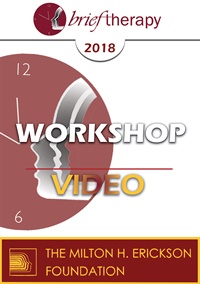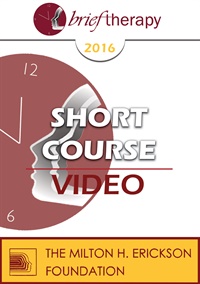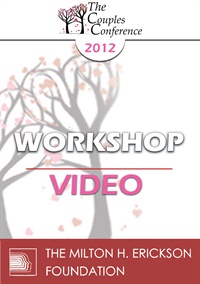- Average Rating:
- Not yet rated
- Topic Areas:
- Keynotes | Attachment | Psychobiological Approach to Couples Therapy (PACT) | Stress
- Categories:
- Couples Conference | Couples Conference 2023 | Pioneers in Couples and Family Therapy
- Faculty:
- Stan Tatkin, PsyD, MFT
- Course Levels:
- Master Degree or Higher in Health-Related Field
- Duration:
- 57:10
- Format:
- Audio and Video
- Original Program Date:
- May 07, 2023
- Short Description:
- A keynote on PACT as a purpose-centered, psychobiological approach to primary attachment. Tatkin outlines secure functioning as a high-bar, team-based relational ethic grounded in fairness, mutuality, and collaboration. Drawing from attachment theory, neuroscience, and arousal regulation, he highlights how bottom-up, real-time assessment guides couples toward durable, principled connection.
- Price:
- $59.00 - Base Price
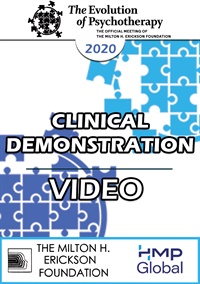
EP20 Clinical Demonstration 11 - Learn to Read Brain Scans: 50 Scans in 60 Minutes - Daniel Amen, MD
- Average Rating:
- Not yet rated
- Topic Areas:
- Neuroscience | Clinical Demonstrations | Psychotherapy
- Categories:
- Evolution of Psychotherapy | Evolution of Psychotherapy 2020
- Faculty:
- Daniel Amen, MD
- Course Levels:
- Master Degree or Higher in Health-Related Field
- Duration:
- 1 hour
- Format:
- Audio and Video
- Original Program Date:
- Dec 13, 2020
- Short Description:
- This engaging session offers a fast-paced tour through fifty brain scans that reveal how imaging transforms mental health practice. Participants learn to recognize patterns linked to trauma, addiction, mood disorders, and toxicity, and discover how SPECT imaging helps differentiate biological from psychological causes. The session provides practical insight into using brain-based evidence to guide treatment, reduce stigma, and inspire hope for healing.
- Price:
-
Sale is $29.00
price reduced from Base Price - $59.00
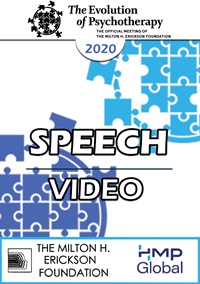
- Average Rating:
- Not yet rated
- Topic Areas:
- Neuroscience | Speeches | Personality Disorders
- Categories:
- Evolution of Psychotherapy | Evolution of Psychotherapy 2020
- Faculty:
- Daniel Amen, MD
- Course Levels:
- Master Degree or Higher in Health-Related Field
- Duration:
- 1 hour 20 minutes
- Format:
- Audio and Video
- Original Program Date:
- Dec 12, 2020
- Short Description:
- This keynote reframes mental illness as a matter of brain health rather than personal weakness or psychological failure. Participants learn how lifestyle, trauma, toxins, and biological factors affect the brain, and how targeted interventions can restore balance. The session introduces practical tools from the “Bright Minds” framework to prevent and reverse cognitive and emotional decline, offering a hopeful new vision for healing the brain and transforming mental health.
- Price:
-
Sale is $29.00
price reduced from Base Price - $59.00
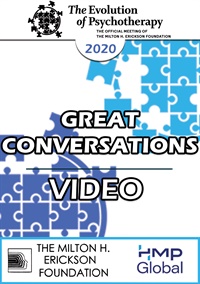
- Average Rating:
- Not yet rated
- Topic Areas:
- Neuroscience | Great Conversations
- Categories:
- Evolution of Psychotherapy | Evolution of Psychotherapy 2020
- Faculty:
- Daniel Amen, MD
- Course Levels:
- Master Degree or Higher in Health-Related Field
- Duration:
- 1 hour 29 minutes
- Format:
- Audio and Video
- Original Program Date:
- Dec 11, 2020
- Short Description:
- This keynote challenges the way psychiatry defines and treats mental illness by showing what happens when clinicians never look at the organ they treat. Through powerful brain imaging examples, participants see how head injuries, toxins, and emotional trauma can masquerade as psychiatric disorders. The session offers a bold vision of mental health as brain health, showing how imaging can improve diagnosis, reduce stigma, and inspire more compassionate care.
- Price:
-
Sale is $29.00
price reduced from Base Price - $59.00
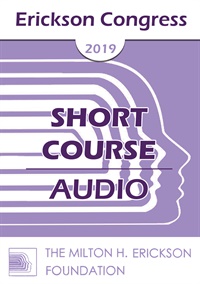
- Average Rating:
- Not yet rated
- Topic Areas:
- Short Courses | Anxiety | Communication | Depression | Neurobiology
- Categories:
- Erickson Congress | Erickson Congress 2019
- Faculty:
- Bart Walsh, MSW
- Duration:
- 1 Hour 29 Minutes
- Format:
- Audio Only
- Original Program Date:
- Dec 12, 2019
- Short Description:
- Chronic anxiety and depression present significant challenges for those affected by these conditions. A behavioral treatment which accesses deep levels of mind-body functioning facilitates remission of these debilitating conditions. This treatment, conceptualized as essential neurobiological communication (ENBC), incorporates a form of body language known as ideomotor signaling.
- Price:
- $15.00 - Base Price
Tags: Anxiety Depression Neurobiology
Credit available - Click Here for more information
- Average Rating:
- Not yet rated
- Topic Areas:
- Workshops | Psychobiological Approach to Couples Therapy (PACT) | Continuing Education | Couples Therapy
- Categories:
- Brief Therapy Conference | Brief Therapy Conference 2018 | Online Continuing Education | Pioneers in Couples and Family Therapy
- Faculty:
- Stan Tatkin, PsyD, MFT
- Course Levels:
- Master Degree or Higher in Health-Related Field
- Duration:
- 2:00:42
- Format:
- Audio and Video
- Original Program Date:
- Dec 07, 2018
- Short Description:
- This workshop explores projective identification in couple therapy—a powerful yet often overlooked dynamic where partners unconsciously project disowned feelings onto each other. Through video demonstrations and clinical techniques like cross-tracking and circular questioning, therapists learn to spot nonverbal cues and emotional undercurrents. Emphasizes brain-based strategies and practical interventions to decode implicit communication and accelerate therapeutic progress.
- Price:
-
Sale is $29.00
price reduced from Base Price - $59.00
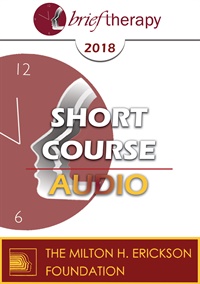
- Average Rating:
- Not yet rated
- Topic Areas:
- Short Courses | Anxiety | Communication | Depression | Neurobiology | Brief Therapy
- Categories:
- Brief Therapy Conference | Brief Therapy Conference 2018
- Faculty:
- Bart Walsh, MSW
- Duration:
- 1:29:10
- Format:
- Audio Only
- Original Program Date:
- Dec 06, 2018
- Short Description:
- Chronic anxiety and depression present significant challenges for those affected by these conditions. A behavioral treatment which accesses deep levels of mindbody functioning facilitates remission of these debilitating conditions. This treatment, conceptualized as essential neurobiological communication (ENBC), incorporates a form of body language known as ideomotor signaling. Because these are chronic conditions, the affected individual learns how to fully manage these states on their own. Also presented is a noninvasive, structured protocol for reducing the adverse influence of unresolved emotion on present experience. Essential to this model is a progressive ratification sequence intended to ground emotional adjustments in thought, perception and behavior. This brief procedure is a useful adjunct to other treatment modalities and instrumental
- Price:
- $15.00 - Base Price
Credit available - Click Here for more information
- Average Rating:
- Not yet rated
- Topic Areas:
- Addiction | Couples Therapy | Workshops | Continuing Education | Love | Neurobiology | Neuroscience
- Categories:
- Couples Conference | Couples Conference 2018 | Online Continuing Education
- Faculty:
- Helen E. Fisher, PhD
- Course Levels:
- Master Degree or Higher in Health-Related Field
- Duration:
- 1:57:48
- Format:
- Audio and Video
- Original Program Date:
- May 04, 2018
- Short Description:
- Biological Anthropologist Helen Fisher discusses four broad basic styles of thinking and behaving associated with four primary brain systems: the dopamine, serotonin, and testosterone and estrogen/oxytocin systems. She discusses why people are predisposed to love one person rather than another (mate choice). She hypothesizes that individuals who primarily express of the constellation of traits linked with each of these brain systems may be predisposed to different forms of love addiction, includ
- Price:
-
Sale is $29.00
price reduced from Base Price - $59.00
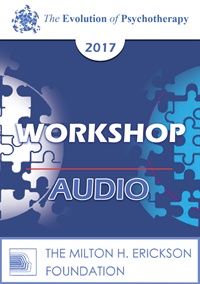
- Average Rating:
- Not yet rated
- Topic Areas:
- Workshops | Neuroscience | Neurobiology | Ericksonian Hypnosis and Therapy Techniques | Experiential Therapy
- Bundle(s):
- Learning Track - EP17 Erickson Download
- Categories:
- Evolution of Psychotherapy | Evolution of Psychotherapy 2017 | Evolution of Psychotherapy Erickson Learning Track
- Faculty:
- Ernest Rossi, PhD | Kathryn Rossi, PhD
- Duration:
- 2:48:35
- Format:
- Audio Only
- Original Program Date:
- Dec 17, 2017
- Short Description:
- In this experiential workshop, we will learn the theory and practice of methods evolved out of Milton H Erickson’s innovative approaches to therapeutic hypnosis as presented in our new book. These easy-to-learn methods can facilitate Erickson’s natural problem solving and MindBody Healing that can supplement CBT, mindfulness, meditation, movement, and yoga.
- Price:
- $15.00 - Base Price
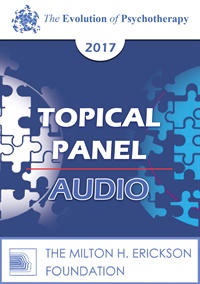
- Average Rating:
- Not yet rated
- Topic Areas:
- Topical Panels | Art and Creativity | Neurobiology | Psychotherapy | Communication
- Categories:
- Evolution of Psychotherapy | Evolution of Psychotherapy 2017
- Faculty:
- Jean Houston, PhD | Scott Miller, PhD | Daniel Siegel, MD
- Duration:
- 1:01:30
- Format:
- Audio Only
- Original Program Date:
- Dec 16, 2017
- Short Description:
- Psychotherapy is an amalgamation of science and art. All we’ve can be created that amalgamates the art of effective therapeutic communication and empirically validated orientations.
- Price:
- $15.00 - Base Price
Credit available - Click Here for more information
- Average Rating:
- Not yet rated
- Topic Areas:
- Clinical Demonstrations | Psychotherapy | Relationships | Communication | IMAGO
- Categories:
- Evolution of Psychotherapy | Evolution of Psychotherapy 2017 | Online Continuing Education | Pioneers in Couples and Family Therapy
- Faculty:
- Harville Hendrix, PhD | Helen LaKelly Hunt, PhD
- Course Levels:
- Master Degree or Higher in Health-Related Field
- Duration:
- 1:02:47
- Format:
- Audio and Video
- Original Program Date:
- Dec 15, 2017
- Short Description:
- This clinical demonstration utilizes Imago Relationship Therapy, focusing on identifying and addressing childhood wounds to support mutual healing. Using structured dialogue, sentence stems, mirroring, and validation, partners share early life challenges to build empathy and emotional connection. The approach helps reduce emotional reactivity and strengthen relational skills.
- Price:
- $0.00 - $29.00
Credit available - Click Here for more information
- Average Rating:
- Not yet rated
- Topic Areas:
- Great Debates | Post-Traumatic Stress Disorder (PTSD) | Trauma | Neurobiology | Psychotherapy
- Bundle(s):
- Learning Track - EP17 Trauma Stream
- Categories:
- Evolution of Psychotherapy | Evolution of Psychotherapy 2017 | Evolution of Psychotherapy Trauma Learning Track | Online Continuing Education
- Faculty:
- Donald Meichenbaum, PhD | Bessel van der Kolk, MD
- Course Levels:
- Master Degree or Higher in Health-Related Field
- Duration:
- 1:19:12
- Format:
- Audio and Video
- Original Program Date:
- Dec 14, 2017
- Short Description:
- In the aftermath of traumatic and victimizing experiences, most individuals are impacted, but 75% evidence resilience while 25% “get stuck” and develop PTSD and co-occurring disorders. This presentation will discuss what distinguishes these two groups and considers the implications for treatment.
- Price:
-
Sale is $29.00
price reduced from Base Price - $59.00

- Average Rating:
- Not yet rated
- Topic Areas:
- Couples Therapy | Trauma | Keynotes | Intimacy | Trauma Studies
- Categories:
- Couples Conference | Couples Conference 2017 | Pioneers in Couples and Family Therapy
- Faculty:
- Janina Fisher, PhD
- Duration:
- 54:20
- Format:
- Audio Only
- Original Program Date:
- Apr 02, 2017
- Short Description:
- Fisher explores trauma's profound impact on couples' relationships, revealing how past experiences shape attachment patterns, trigger conflicts, and disrupt intimacy. Through sensory motor psychotherapy, she offers innovative strategies for healing, emphasizing safety, understanding non-verbal memories, and rebuilding connection.
- Price:
- $15.00 - Base Price

- Average Rating:
- Not yet rated
- Topic Areas:
- Couples Therapy | Trauma | Keynotes | Intimacy | Trauma Studies
- Bundle(s):
- Learning Track - Turn Down the Trauma
- Categories:
- Couples Conference | Couples Conference 2017 | Pioneers in Couples and Family Therapy
- Faculty:
- Janina Fisher, PhD
- Course Levels:
- Master Degree or Higher in Health-Related Field
- Duration:
- 54:20
- Format:
- Audio and Video
- Original Program Date:
- Apr 02, 2017
- Short Description:
- Fisher explores trauma's profound impact on couples' relationships, revealing how past experiences shape attachment patterns, trigger conflicts, and disrupt intimacy. Through sensory motor psychotherapy, she offers innovative strategies for healing, emphasizing safety, understanding non-verbal memories, and rebuilding connection.
- Price:
-
Sale is $29.00
price reduced from Base Price - $59.00
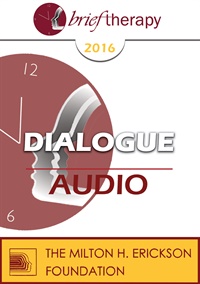
- Average Rating:
- Not yet rated
- Topic Areas:
- Attachment | Neuroscience | Psychology | Dialogues | Mindfulness | Buddhism
- Categories:
- Brief Therapy Conference | Brief Therapy Conference 2016 | Pioneers in Couples and Family Therapy
- Faculty:
- Ronald Siegel, PsyD | Stan Tatkin, PsyD, MFT
- Duration:
- 1:03:00
- Format:
- Audio Only
- Original Program Date:
- Dec 10, 2016
- Short Description:
- This presentation bridges mindfulness, Buddhist psychology, neuroscience, and attachment theory to deepen therapeutic work. It explains how mindfulness fosters awareness and self-regulation, while secure attachment provides emotional safety. Neurobiological insights—like cortical thickening and improved regulation—support the integration of these practices. Practical applications focus on using mindfulness and mutual regulation to enhance attunement and connection in couples therapy.
- Price:
- $15.00 - Base Price
- Average Rating:
- Not yet rated
- Topic Areas:
- Post-Traumatic Stress Disorder (PTSD) | Psychology | Short Courses | Energy Psychology | Brief Therapy | Neurobiology | Polyvagal Theory
- Categories:
- Brief Therapy Conference | Brief Therapy Conference 2016
- Faculty:
- Robert Schwarz, PsyD
- Course Levels:
- Master Degree or Higher in Health-Related Field
- Duration:
- 1:30:38
- Format:
- Audio and Video
- Original Program Date:
- Dec 08, 2016
- Short Description:
- Clinical experience and research has shown energy psychology (EP) to be a highly effective brief treatment of PTSD in contexts that range from war related PTSD in US veterans to the effects of genocide in Rwandan orphans. This workshop presents an elegant integration of Interpersonal neurobiology, polyvagal theory and memory reconsolidation that underlies energy psychology approaches to trauma treatment. Discover how to actually remove the traumatic energy/emotions from traumatic events that facilitates insight, mindfulness and posttraumatic growth.
- Price:
-
Sale is $29.00
price reduced from Base Price - $59.00
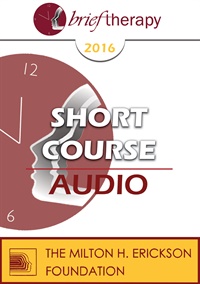
- Average Rating:
- Not yet rated
- Topic Areas:
- Short Courses | Energy Psychology | Brief Therapy | Single-Session | Ericksonian Hypnosis and Therapy Techniques
- Categories:
- Brief Therapy Conference | Brief Therapy Conference 2016
- Faculty:
- Cheryl Bell-Gadsby, M.A., R.C.C. | Kathleen Donaghy
- Duration:
- 1:32:46
- Format:
- Audio Only
- Original Program Date:
- Dec 08, 2016
- Short Description:
- Looking for brief interventions that create noticeable shifts in a single session? This workshop offers an experiential introduction to energy psychology, blending tapping, fractionation, open-hearted awareness, and Ericksonian trance work. Grounded in attachment science and somatic regulation, it demonstrates practical tools for calming the nervous system, releasing emotional charge, and strengthening client resilience. Participants leave with a flexible “toolbox” for working efficiently with anxiety, self-doubt, trauma, and stuck patterns.
- Price:
- $15.00 - Base Price
- Average Rating:
- Not yet rated
- Topic Areas:
- Couples Therapy | Keynotes | Psychobiological Approach to Couples Therapy (PACT)
- Categories:
- Couples Conference | Couples Conference 2016 | Pioneers in Couples and Family Therapy
- Faculty:
- Stan Tatkin, PsyD, MFT
- Course Levels:
- Master Degree or Higher in Health-Related Field
- Duration:
- 51:04
- Format:
- Audio and Video
- Original Program Date:
- May 13, 2016
- Short Description:
- This session presents a psychobiological approach to guiding couples toward secure functioning—where partners act as a cooperative, principle-driven system. Tatkin demonstrates cross-dialogic techniques for clarifying attachment strategies, desires, and hidden agendas. Emphasizing non-verbal attunement, state-dependent perception, and strategic therapist stance, the model offers clinicians tools to decode implicit dynamics and foster lasting relational alignment.
- Price:
-
Sale is $29.00
price reduced from Base Price - $59.00
- Average Rating:
- Not yet rated
- Topic Areas:
- Keynotes | Couples Therapy | Neurobiology
- Categories:
- Couples Conference | Couples Conference 2016
- Faculty:
- Daniel Siegel, MD
- Course Levels:
- Master Degree or Higher in Health-Related Field
- Duration:
- 1:03:24
- Format:
- Audio and Video
- Original Program Date:
- May 13, 2016
- Short Description:
- The interdisciplinary field of Interpersonal Neurobiology combines all disciplines of science and other fields into one framework and offers a definition of the mind and of mental health that are of practical benefit to those seeking to enhance resilience and well-being. This perspective proposes that one aspect of the mind is an "emergent, self-organizing, embodied and relational process that regulates the flow of energy and information." From this view, a healthy mind and health itself emerge from a process called integration–the linkage of differentiated parts.
- Price:
-
Sale is $29.00
price reduced from Base Price - $59.00
Tags: Couples Therapy Neurobiology
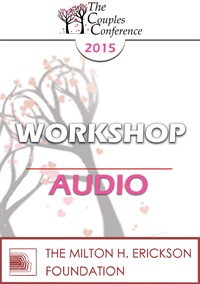
- Average Rating:
- Not yet rated
- Topic Areas:
- Couples Therapy | Workshops | Psychobiological Approach to Couples Therapy (PACT) | Therapist Development
- Categories:
- Couples Conference | Couples Conference 2015 | Pioneers in Couples and Family Therapy
- Faculty:
- Stan Tatkin, PsyD, MFT
- Duration:
- 1:54:28
- Format:
- Audio Only
- Original Program Date:
- Apr 24, 2015
- Short Description:
- This workshop explores couple therapy with highly disorganized partners, where therapeutic structure and stance are essential. Using attachment, regulation, and neurobiological models, it addresses trauma-related dysregulation. Clinical examples illustrate how facial cues, pacing, and therapist attunement support emotional regulation and relational repair in the face of volatility.
- Price:
- $15.00 - Base Price
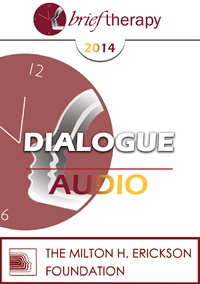
- Average Rating:
- Not yet rated
- Topic Areas:
- Dialogues | Neurobiology | Brief Therapy | Neuroscience
- Categories:
- Brief Therapy Conference | Brief Therapy Conference 2014
- Faculty:
- Pat Love, EdD | Ernest Rossi, PhD
- Duration:
- 56:18
- Format:
- Audio Only
- Original Program Date:
- Dec 13, 2014
- Short Description:
- BT14 Dialogue 04 - The Neurobiology of Change - Pat Love, EdD and Ernest Rossi, PhD Educational Objectives: Given a topic, describe the differing approaches to psychotherapy, and identify the strengths and weaknesses of each approach.
- Price:
- $15.00 - Base Price
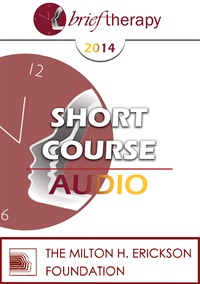
- Average Rating:
- Not yet rated
- Topic Areas:
- Anxiety | Depression | Short Courses | Communication | Neurobiology | Brief Therapy | Trauma
- Categories:
- Brief Therapy Conference | Brief Therapy Conference 2014
- Faculty:
- Bart Walsh, MSW
- Duration:
- 1:31:46
- Format:
- Audio Only
- Original Program Date:
- Dec 11, 2014
- Short Description:
- There are multiple explanations and theories to explain the creation of anxiety, depression and trauma creation. Many emphasize pathology, permanence of conditions and use multi-syllable words and encourage medical interventions to treat symptoms. This paradigm is often not effective for improving the lives of individuals treated. This course looks at non-medical underpinnings to conceptualize the creation of anxiety, depression and trauma. This conceptualization when understood by the clinician; makes them a better facilitator and co-creator in the treatment process. A natural, holistic understanding also empowers the clinician and client and moves all parties involved closer to health.
- Price:
- $15.00 - Base Price

- Average Rating:
- Not yet rated
- Topic Areas:
- Family Therapy | Topical Panels | Neuroscience | Brief Therapy
- Categories:
- Brief Therapy Conference | Brief Therapy Conference 2012 | Pioneers in Couples and Family Therapy
- Faculty:
- Ellyn Bader, PhD | Camillo Loriedo, MD, PhD | Esther Perel, MA, LMFT | Frank Dattilio, PhD, ABPP
- Duration:
- 1:02:20
- Format:
- Audio Only
- Original Program Date:
- Dec 07, 2012
- Short Description:
- Experts explore innovative techniques for working with couples and families, combining cognitive-behavioral methods, systems thinking, and cultural sensitivity to address relationship challenges effectively. Learn strategies for identifying motivation, navigating cultural differences, and creating meaningful therapeutic interventions.
- Price:
- $15.00 - Base Price
- Average Rating:
- Not yet rated
- Topic Areas:
- Keynotes | Couples Therapy | Love | Neurobiology | Neuroscience | Relationships
- Categories:
- Couples Conference | Couples Conference 2012
- Faculty:
- Helen E. Fisher, PhD
- Course Levels:
- Master Degree or Higher in Health-Related Field
- Duration:
- 58:07
- Format:
- Audio and Video
- Original Program Date:
- Apr 29, 2012
- Short Description:
- Anthropologist Helen Fisher uses her brain scanning studies (fMRI) of people happily in love, rejected in love and in love long-term to discuss the traits of romantic love, love-at-first-sight, and addiction to love. She focuses on her current research on 40,000 men and women to propose that four broad cognitive/behavioral personality trait constellations have evolved associated with the neural systems for dopamine, serotonin, testosterone and estrogen. Then she discusses her data on mate choice among 28,000 individuals to pro-pose why we are chemically drawn to one person rather than another.
- Price:
-
Sale is $29.00
price reduced from Base Price - $59.00
- Average Rating:
- Not yet rated
- Topic Areas:
- Workshops | Love | Couples Therapy | Neurobiology
- Categories:
- Couples Conference | Couples Conference 2012
- Faculty:
- Helen E. Fisher, PhD
- Course Levels:
- Master Degree or Higher in Health-Related Field
- Duration:
- 1:35:03
- Format:
- Audio and Video
- Original Program Date:
- Apr 29, 2012
- Short Description:
- In her lecture, Fisher discusses four biologically based styles of thinking and behaving and, using her data on mate choice among 28,000 individuals, shows why we are chemically drawn to one person rather than another. In this workshop Fisher goes deeper into these natural temperament constellations, and discusses how partners with very different (and similar) biological styles of thinking and behaving interact to create great joy, confusion and sorrow in their partnerships.
- Price:
-
Sale is $29.00
price reduced from Base Price - $59.00
Tags: Love Couples Therapy Neurobiology



